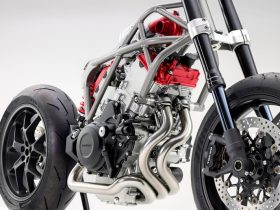For most of us, filling a car with fuel, or charging an electric vehicle is a simple task. But for disabled drivers, people with reduced mobility and older people it can be a significant challenge.
Now, Ford has developed a prototype robot charging station that drivers operate via their smartphone from inside their electric vehicle. 1 The technology could enable disabled drivers to stay in the car while charging, or they could leave the car while the robot does all the work.
Disabled drivers have already identified ease of charging as a key purchase consideration for electric vehicles. 2 Ford is testing the robot charging station as part of a research project to develop hands-free charging solutions for electric vehicles and fully automatic charging for autonomous vehicles.
Following initial lab testing, Ford researchers are now putting the robot charging station to the test in real-life situations. Once activated, the station cover slides open and the charging arm extends towards the inlet with the help of a tiny camera. For the trial, drivers were able to monitor the charge status via the FordPass app. 3 After charging, the arm retracts back into place.
In future, the robot charging station, custom-made by Dortmund University, in Germany, could be installed at disabled parking spaces, in car parks or at private homes. Further applications could include fast and efficient charging of company fleets. The technology could also support more powerful charging to charge vehicles in a much shorter time.
Looking ahead, the process could become fully automated, with minimal or no driver involvement. The driver would simply send the vehicle to the charging station, with the infrastructure ensuring it reaches and returns from its destination autonomously.
On the road to electrification
This research project complements Ford’s commitment to electrification. A follow-up project with the charging network provider IONITY will look to further improve the robot charging station.
Ford is also researching into robot charging solutions in combination with Automated Valet Parking, as demonstrated at IAA in Munich, Germany, last year.
Ford’s fast-growing Blue Oval Charging Network provides customers with access to a network of over 300,000 chargers across Europe. To help drivers find charging stations and pay for charging, Ford Charge Assist can be accessed using the touchscreen of Ford’s SYNC 4 connectivity and entertainment system. 4
For commercial vehicle customers, Ford Pro Charging offers bespoke charging solutions incorporating charging equipment, ongoing maintenance and management software that help reduce time-consuming paperwork and charge schedule planning.
Ford recently joined 27 companies in a petition to ensure all new cars and vans in Europe are zero emission from 2035 and called for targets to grow electric vehicle charging infrastructure in Europe to keep pace with electric vehicle growth rates.
The company believes a unified approach encompassing governments, European Union institutions, the entire auto industry, energy providers, local authorities and consumers is required to accelerate the development of a comprehensive, easily accessible and efficient charging infrastructure at home, in the workplace and in public locations. 5
Quotes
“Ford is committed to ensuring freedom of movement and right now refuelling or charging your vehicle can be a major problem for some drivers. The robot charging station could be an added convenience for some people but – absolutely essential for others.”
Birger Fricke, research engineer, Research and Innovation Center, Ford of Europe
“I stopped filling up my car myself years ago, because it became very strenuous. My husband does it for me. The introduction of a robot charging station would offer me a much greater level of independence.”
Angela Aben, Employee Communications, Ford of Europe, who uses a power-assisted wheelchair to gain more mobility and independence
Notes
1 This vehicle feature is being developed for trial purposes only and is currently not available for purchase.
2 A recent survey in the UK showed that 61 per cent of disabled drivers would consider buying an electric vehicle only if charging was made more accessible. https://www.ridc.org.uk/transport/inaccessible-charging-barrier-electric-disabled-and-older-drivers
3 FordPass App, compatible with select smartphone platforms, is available via a download. Message and data rates may apply. The app enables a range of connected services, including checking on vehicle health, fuel levels and range, plus the remote locking and unlocking of doors.
4 Ford ChargeAssist is currently available on E-Transit only. Don’t drive while distracted or while using handheld devices. Use voice-operated systems when possible. Some features may be locked out while the vehicle is in gear. Not all features are compatible with all phones.
5 Ford estimates that on average the weekly installation rate of charging stations needs to speed up by a factor of 10 (EU27 and UK) to grow customers’ confidence in the availability of a dense and reliable charging network meeting their mobility needs.











